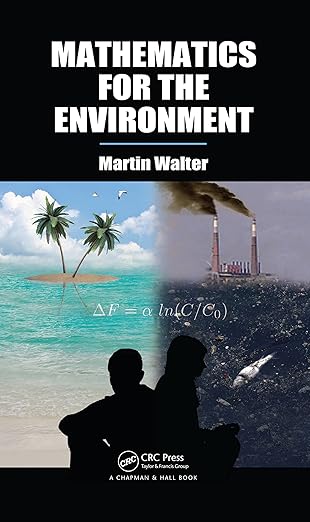
|
FreeComputerBooks.com
Links to Free Computer, Mathematics, Technical Books all over the World
|
|
- Title: Mathematics for the Environment
- Author(s) Martin Walter
- Publisher: Chapman and Hall/CRC; 1st edition ; eBook (Creative Commons Licensed)
- License(s): Creative Commons License (CC)
- Hardcover: 678 pages
- eBook: PDF and Read Online
- Language: English
- ISBN-10/ASIN: 1439834725
- ISBN-13: 978-1439834725
- Share This:

|
This book shows how to employ simple mathematical tools, such as arithmetic, to uncover fundamental conflicts between the logic of human civilization and the logic of Nature. These tools can then be used to understand and effectively deal with economic, environmental, and social issues.
About the Authors- Martin Walter is a professor in the Department of Mathematics at the University of Colorado at Boulder.
- Applied Mathematics
- Physics, Computational Physics, and Mathematical Physics
- Numerical Analysis and Scientific Computing
- Calculus and Mathematical Analysis
- Differential Equations
 Similar Books:
Similar Books:
-
 Introduction to Applied Mathematics (Alan Parks)
Introduction to Applied Mathematics (Alan Parks)
This book provides you with analytical tools used both to express the main ideas in quantitative disciplines and to provide you with numerical tools that will enable you to investigate applied problems directly and in detail.
-
 Applied Mathematics by Example (Jeremy Pickles)
Applied Mathematics by Example (Jeremy Pickles)
Stimulating, thought-provoking study shows how abstract methods of pure mathematics can be used to systematize problem-solving techniques in applied mathematics. Explaining the nature of applied mathematics.
-
 Applied Mathematics in Ferroelectricity and Piezoelectricity
Applied Mathematics in Ferroelectricity and Piezoelectricity
This book provides the readers solid mathematical background for studying Ferroelectricity and Piezoelectricity, as a supplemental reference of converting a complicated phenomenon expressed by a function.
-
 Introduction to Numerical Methods for Variational Problems
Introduction to Numerical Methods for Variational Problems
This textbook teaches Finite Element Methods from a computational point of view. It focuses on how to develop flexible computer programs with Python, a programming language in which a combination of symbolic and numerical tools.
-
 Mathematical Introduction to Deep Learning (Arnulf Jentzen, et al)
Mathematical Introduction to Deep Learning (Arnulf Jentzen, et al)
This book aims to provide an introduction to the topic of deep learning algorithms, coverss essential components of deep learning algorithms in full mathematical detail including different Artificial Neural Network (ANN) architectures and algorithms.
-
 Mathematics for Machine Learning (Marc P. Deisenroth, et al.)
Mathematics for Machine Learning (Marc P. Deisenroth, et al.)
This self contained textbook bridges the gap between mathematical and machine learning texts, introducing the mathematical concepts with a minimum of prerequisites. It provides a beautiful exposition of the mathematics underpinning modern machine learning.
-
 Mathematics for CS and Machine Learning (Jean Gallier, et al.)
Mathematics for CS and Machine Learning (Jean Gallier, et al.)
Covering everything you need to know about machine learning, now you can master the mathematics, computer science and statistics behind this field and develop your very own neural networks!
-
 Mathematical Methods in Quantum Mechanics (Gerald Teschl)
Mathematical Methods in Quantum Mechanics (Gerald Teschl)
This book is a brief, but self-contained, introduction to the mathematical methods of quantum mechanics, with a view towards applications to Schrodinger operators. Very clear and detailed way and supplements it by numerous exercises.
-
 Mathematical Foundations of Quantum Theory
Mathematical Foundations of Quantum Theory
This is a collection of lecture notes, all shared a common interest in answering quantum issues. The goal is to give a mathematically clear and self-containing explanation of the main concepts of the modern language of quantum theory.
-
 The Functional Analysis of Quantum Information Theory
The Functional Analysis of Quantum Information Theory
This book provides readers with a concise introduction to current studies on operator-algebras and their generalizations, operator spaces and operator systems, with a special focus on their application in Quantum Information Science.
-
 Mathematics for Game Developers (Denny Burzynski)
Mathematics for Game Developers (Denny Burzynski)
This book explores the mathematics behind how scenes appear, characters move, and action evolves. The basic ideas of how mathematical instruments control action and motion in the games you develop.
-
 Probability in Electrical Engineering and Computer Science
Probability in Electrical Engineering and Computer Science
This textbook motivates and illustrates the techniques of applied probability by applications in electrical engineering and computer science (EECS). Python labs enable the readers to experiment and consolidate their understanding.





